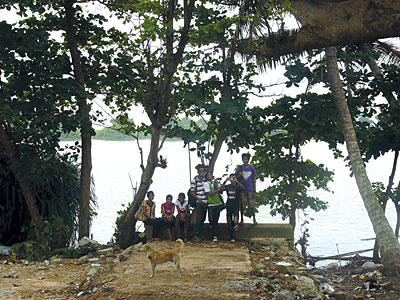 RABI THAPA |
Nepalis are known for being nice to tourists. Or so says the Lonely Planet, which assures travellers they will be 'bewitched by the friendliness and openness of the Nepali people'. Indeed, tourist time is generally more chilled out than in the bellows of northern India, and Nepalis (children in particular, even when they are begging for one rupee one sweet one pen) are fairly well disposed towards those kuires who wander eagerly through their country. This sounds like good news in the run-up to Nepal Tourism Year 2011.
But to be honest, most Nepalis have little to do with tourists. Standard issue tourists, backpackers or five-starrers, will interact largely with formal and informal representatives of the tourist industry, hardly penetrating into the fabric of the Nepali societies they brush against during their time here. This tourist industry can be predatory despite the genuineness of the smiles traded, and certainly labour issues have rubbed raw some of these interactions lately.
Every time I've travelled within Nepal with foreign friends, for instance, something unpleasant impinges on the euphoria of tramping through this land of mountains and jungles, temples and festivals. The worst was the time the Russian jeep carrying our group of five Thais, two Mexicans, and one Frenchwoman from Birenthanti to Pokhara was blocked by taxi drivers insisting they had a monopoly on the route. They wanted us to get off and into one of their cabs (never mind we'd have to pay again), and we only advanced a quarter of an hour later when our driver forced the jeep through a throng of shouting, gesticulating cabbies. At that point I looked back at my friends to reassure them; their incomprehension and fear roused a deep shame in me.
Nepali tourist reps need to understand that Everest notwithstanding, tourists can and will go somewhere else if they feel they are unwelcome or unsafe here. Nepal may be spectacular � but there are any number of spectacular places in the world, and we don't even have a monopoly on the Himalaya. Those taxi drivers at Naya Pul may have felt entitled to demand we use their services, but did they ever stop to think what my friends might say to their friends in Thailand, Mexico and France in years to come?
Making foreigners feel welcome is not about inviting them to spend their money. It means making them feel they are welcome here as visitors. This demands a shift in perceptions on our part, wherein tourists are not just walking ATMs, they are individuals. Tourist reps need to treat tourists with respect, and the rest of us could probably shed some of our indifference, too.
We could learn something from the Sri Lankans. I don't like to make sweeping generalisations about smiles through broken times on the basis of a week-long stay in the southwestern half of the 'resplendent land', but certainly the people we came across, within and without the tourist industry, made us feel welcome. Everyone had a smile and a word for us, even if it was just to say 'Hello!' It wasn't just conversations with those employed at guesthouses, cafes, galleries, restaurants, all of whom were curious ("From Nepal? Lumbini!") and disappointed ("Just one week? Too short!") in equal measure. The man who shooed us away from the tempo drivers at Galle station with a "No need, you can just walk!" was charming enough, but I couldn't help laughing when the heavily armed soldiers at the security checkpoint to the airport greeted us with "Hi! You are going?"
Now, Sri Lanka's no island paradise. Every monolithic cutout of President Rajapaksa leering over us threatened to cut into the charm of the everyday, and I have no illusions about how things are for the 15 per cent of Sri Lankans who live below the poverty line. But just as visitors get the distinct feeling that they're getting the cold shoulder in parts of Vietnam, we felt many Sri Lankans were genuinely pleased to have us visit their country. Where do Nepalis stand as we prepare to welcome more tourists than ever in 2011?
In Surkhet last month, local shop-owner Mitra Chapai accompanied us on a forty-minute walk to the medieval ruins of Kakrebihar for no other reason than to help us out. As we strolled along a forest path, he asked me, "If I went to Europe, would they care as much as we do about tourists who come here?" I was at a loss to answer him. But I'd like to believe we actually do care.
READ ALSO:
Medieval mindsets, DAMAKANT JAYSHI
Whose festival is it anyway?, ARTHA BEED
No Prime Minister, RANJAN ADIGA
A return to reason, BJORN LOMBORG



